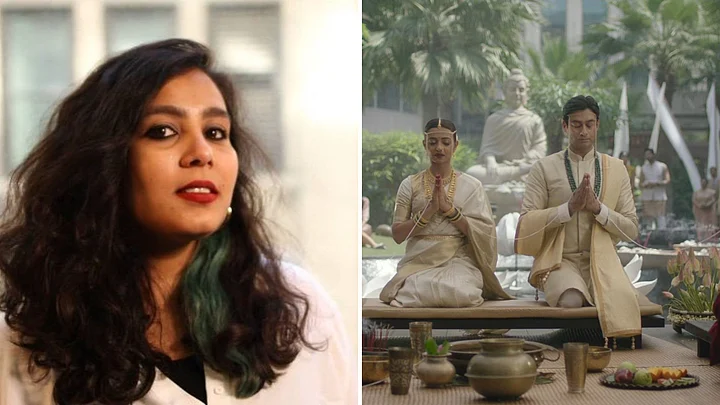Yashica Dutt, author of Coming Out as Dalit, has called out filmmaker Neeraj Ghaywan and the makers of Made In Heaven 2 for using stories from her life and her ideas but not giving her due credits. In episode 5 - 'The Heart Skipped a Beat' - of the Amazon Prime Video show, directed by Neeraj, Radhika Apte plays the role of Pallavi Menke, an accomplished Dalit writer who has written a book about hiding her identity for the longest time and ultimately choosing to embrace it. Despite being so successful and such a powerful voice, Pallavi struggles to have a Buddhist wedding because her in-laws, belonging to another caste, find it difficult to accept her identity.
The episode has been hailed on social media, with many saying how Dalits are finally getting the representation on television that they deserve.
Pallavi's character has been inspired from Yashica's life. Like Yashica, Pallavi also writes a book titled 'Denied' and she keeps mentioning the phrase "coming out," which is the title of Yashica's book and a phrase she popularised. However, Yashica's name does not feature in the credits.
Taking to social media, the Dalit author has shared how the show's makers have used her life story without even consulting her and she has demanded for due credits. “Let's acknowledge the Dalit labor and set a precedent for giving credit where it's due instead of the now common practice in the streaming world of ‘taking it without permission first, apologizing later’. THIS is what coming out as Dalit really looks like,” Yashica wrote.
'The Ideas I Cultivated Were Taken Without Permission'
Elaborating on how she never received due recognition Yashica wrote on X (previously Twitter), "The scene where the Dalit author who is from Columbia, has written a book about 'Coming Out', and talks about how her grandmother 'manually cleaned toilets' (while wearing all blue as an homage to Ambedkar), asserts her selfhood with her life partner to-be, gave me chills. It was surreal to see a version of my life on screen that wasn't but yet was still me. But soon the heartbreak set in. They were my words but my name was nowhere. What could have been a celebration of our collective ideas was now tinged with sadness. The ideas I cultivated, that are my life's work, that I continue to receive immense hate still for just speaking, were taken without permission or credit.”
“Dalits have a long history of being taken from, erased, ignored, obliterated from our own stories. Dalit women in particular are the easiest to take from, what's the worth in the labor they've created anyway. It's for everybody to claim. Except this time. I'm reclaiming my work, my worth and my contribution to the discourse and history, defying the order of what's expected of me as a woman who is always supposed to fine tune the 'register of her rage'. The Made in Heaven episode is stunning in its portrayal of a Dalit woman and her Buddhist inter-caste wedding. It also unfortunately erases my contribution to my own ideas.”
'Dalit Writers Like Neeraj Ghaywan Have Revolutionised Our Cinematic Language'
“As a young Dalit child, my Mum and I had an inside joke ‘Our lives are so crazy, they should make a movie about it’. We knew that would never happen. There were no Dalit characters on screen who were humanized beyond their suffering. Before I came out as Dalit in 2016, there was no vocabulary to identify the process of revealing your Dalitness after hiding it for years and owning it with pride either,” Yashica wrote.
She added, “Today, in 2023, there is both. Dalit directors like Neeraj Ghaywan have revolutionized our cinematic language by showcasing unapologetic Dalits in Bollywood, a tradition that has an even longer history in Southern cinema. The Heart Skipped a Beat, the fifth episode of Amazon Prime's Made in Heaven is no less than a cinematic triumph when it comes to showcasing what it truly looks like for a Dalit woman to take her power back in this casteist society.”
Yashica also acknowledged Neeraj Ghaywan's Instagram post, written three days after the series was out, wherein he credits her as being the inspiration behind the episode.
Yashica further wrote that she was credited only after viewers noticed the missing credentials. She requested Neeraj, Zoya Akhtar and Reema Kagti to recognise her life's work, that contributed to the episode. “So that the millions of its viewers know one its central ideas was not created out of ether, but out of the blood, sweat and a lifetime of tears of a Dalit woman that the world had decided to cast aside.”
(At The Quint, we question everything. Play an active role in shaping our journalism by becoming a member today.)
